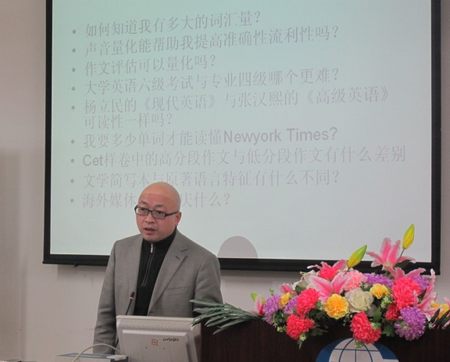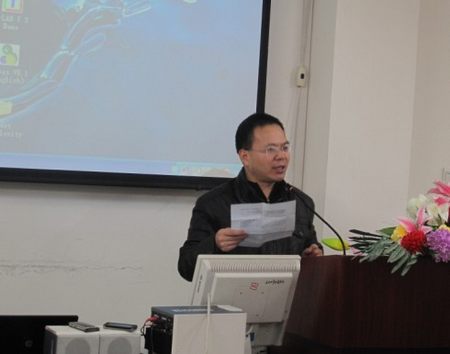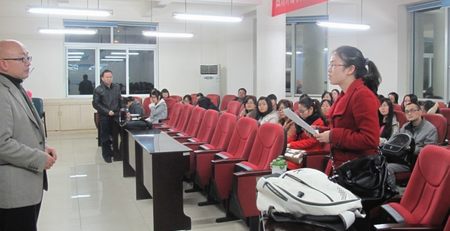
重庆邮电大学汪顺玉教授应邀来我校做学术报告
发布时间:2012-11-20 浏览量:
| 11月15日晚,川外学坛“学术大视野”教师讲堂如期在博文楼6楼隆重举行。本期主讲人为重庆邮电大学外语学院常务副院长汪顺玉教授,主讲题目为“机助文本分析在外语研究中的应用”,报告由姜孟教授主持,我校部分青年教师、访问学者和各年级研究生参加了此次活动。 汪顺玉教授首先以外语词汇测量、发音训练、作文评估等几个紧贴外语学习的设问,引出了本次报告的主题。接着,他扼要界定了“文本”的多模态含义,简析了外语教师的文本来源和基本类别。然后,报告进入核心部分:机助文本分析如何为外语教学和研究提供支撑。 在报告中,汪顺玉教授指出,机助文本分析可以从语音、词汇和句法三个方面为外语教学提供支持。在语音方面,我们可以运用计算机对学生进行语音训练,可以通过语速分析和语调分析找出学生发音中存在的问题,提高发音的准确性。汪教授还给大家推荐了几个语音分析的软件:Praat和Speech Analyzer。在词汇方面,我们可以运用计算机对词汇进行信息量化、频率分析、词汇覆盖率与阅读难度分析、超纲词汇分析、错误词汇分析、根据学生写作文本估计词汇量等。汪教授还解释了词汇丰富性的含义、重要性及其主要指标(词汇变异度、词汇密度、词汇丰富度、错词数)。他给大家推荐了Lexitutor、Range、V-size、D-Value等几个词汇分析软件。在句法方面,我们可以对文本的句长和名词、动词前修饰成分的复杂程度、连贯与衔接分析进行分析。在这一方面,常用的软件有coh-metrix、T-lab等。 在报告之后,汪顺玉教授与大家进行了交流互动。大家踊跃提问、发言,就自己感兴趣的问题展开热烈讨论,气氛非常活跃。最后,姜孟教授做了简要点评。他指出,本次报告信息量大、前沿性强,体现了语言理论研究与应用研究的结合,给我们“所学一定要致用”的深刻启迪。 最后本次学坛讨论在大家热烈的掌声中结束。
主讲人汪顺玉教授
主持人姜孟教授
现场同学积极提问
SISU Academic Forum on the Application of Computer-aided Text Analysis in Foreign Language Teaching and Research Held Successfully SISU Academic Forum began as scheduled at 7 pm, November 15, 2012. This talk, entitled the Application of Computer-aided Text Analysis in Foreign Language Teaching and Research was hosted by Professor Jiang Meng and addressed by Professor Wang Shunyu. Many postgraduates from the university actively attended this symposium. How do I know how my vocabulary is? Can quantification of voice help improve my fluency and accuracy? Can we quantify the assessment of composition? Which one is harder, CET 6 or TEM 8? Starting with such a few practical and interesting questions which attracted the audience’s attention, Prof Wang put forward his topic, the Application of Computer-aided Text Analysis in Foreign Language Teaching and Research. He stated that all these questions can be answered through the use of computer software. Then, Prof Wang explained that text was multi-modal, including sound, video and words, all of which can be analyzed. Besides, Prof Wang mentioned some sources of texts of foreign language teacher, like the ready-made corpus, texts produced by students, teaching materials, online materials, etc. After that, Prof Wang came to the most important part, the help provided by computer-aided text analysis for foreign language teaching and research. In his opinion, the help can be supplied in terms of three aspects, phonology, lexicon and syntax. In respect of phonology, we can make use of some software to analyze students’ speech speed and intonation, so that we can find and solve the problems. Moreover, Prof Wang recommended some good software, Praa and Speech Analyzer. As regards the lexicon, we can quantify the lexicon information, analyze lexicon frequency, coverage and reading difficulty, and estimate vocabulary. Some good lexicon analysis software was recommended, Lexitutor、Range、V-size、D-Value and so on. With regard to syntax, we can take advantage of software to conduct analysis on the length of the sentence, the complexity of the modifiers and cohesion and coherence, and the software that we can use was coh-metrix and T-lab. After Prof Wang finished his report, Prof Jiang made a brief comment on it. He mentioned that there were two merits of this report, rich information and cutting edge. Prof Jiang pointed that in information age computer was undoubtedly important, while students majored in linguistics were usually weak in this area, so this report was of great profit for us. At last, many students raised their hands and asked questions and Prof answered them one by one patiently. The forum ended in thunderous applause. Reported by Zheng San
文:2011级研究生郑三、川外学坛;图:川外学坛; 编辑:王玲 |




